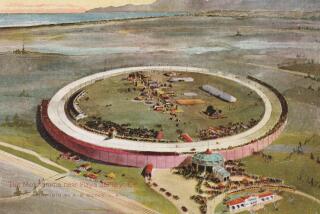Bolt by Dick Francis (Putnam’s: $17.95; 301 pp.)
- Share via
Steeplechase jockey-turned-author Dick Francis’ last racing tale, “Break In,” introduced us to a self-reliant rider named Kit Fielding who had to deal with a violent family feud that threatened him and his twin sister, a budding romance with a headstrong young woman and the navigation of several rather difficult races. The first of many surprises greeting us in Francis’ new tale is the discovery that there is an Act Two to Kit’s life.
Though many of the novelist’s central characters are jockeys or former jockeys, he has gone out of his way to eschew series books, probably in an effort to make the point that, though they may share some common physical traits, jockeys are as individually unique as any other professionals.
“Bolt” is less a sequel than a continuation of the original book, and yet “Break In” is not required reading. With an almost miraculous economy of words, Francis swiftly sums up as much information as is needed from the earlier book, while simultaneously untying the ends that had been so neatly gathered. As Kit explains: “Winning the lady, back in November, had been unexpected, an awakening, deeply exciting . . . happy. Keeping her, in the frosts before spring, was proving the merry devil. My much-loved dark-haired young woman seemed frighteningly to be switching her gaze from a steeplechase jockey (myself) to an older, richer sophisticate of superior lineage. . . . “ Returning also is the malevolent Maynard Allardeck, whose family has despised the Fieldings for generations. Kit cleverly devised a stratagem to keep him at bay in the last book, but Allardeck has not taken his defeat gracefully and, as a racing steward, is in a position to cause trouble.
And there is a powerful new villain, Henri Nanterre, who will stop at nothing, apparently, to convince his partner, Kit’s prospective uncle-in-law, to convert their construction company into an armament empire. First he threatens the partner’s wife; when Kit checks that challenge, he ups the ante. The wife’s championship horses, Kit’s mounts, are brutally slain by a bolt gun, a captive-bullet weapon that is supposed to provide a merciful death for animals in pain. And when the jockey’s fiance and even her “older richer sophisticate” are threatened, Kit is forced to devise a particularly devious plan to spike Nanterre’s guns.
Francis has said in interviews that his tales aren’t thrillers. He prefers to call them “adventure stories.” None of them proves his point better than “Bolt.” The sport of kings. The wealthy and titled reacting to stress. The setting of traps to catch evildoers rather than resorting to the police. This is not exactly the stuff that turns the bleak world of John Le Carre so chillingly cold and gray. Actually, it is closer in spirit to the capers that kept “The Saint,” Simon Templar, in champagne and caviar for so many decades. Admittedly, the characterizations are a bit sketchier than the author has settled for in the past. And his lead is more idealistically heroic--dashing, wealthy, clever and a great deal more confident--than others who have worn the Francis colors. But the dialogue--from tough talk to drawing-room banter--rings entertainingly true and bristles with edgy energy. The storytelling is faultless. And the track is so fast, it seems as if we have scarcely cleared the starting gate when we are bolting past the finish line. That’s how it goes when you ride with a champion who knows the course.
More to Read
Sign up for our Book Club newsletter
Get the latest news, events and more from the Los Angeles Times Book Club, and help us get L.A. reading and talking.
You may occasionally receive promotional content from the Los Angeles Times.








